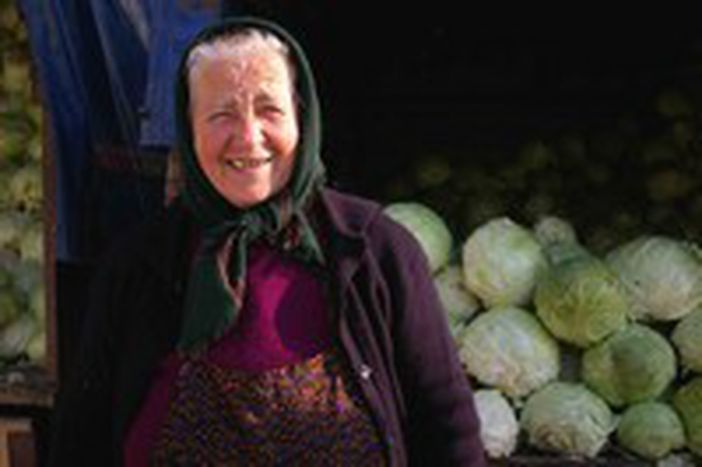
Romania: a wealth of poverty
Published on
Translation by:
 melanie cutler
melanie cutler
Romania is regarded as the poorhouse of Europe. It's booming economy is dividing it into a small upper class and a larger emergent underclass
Ioana Constantin is selling a Romanian delicacy – cabbage. A classic Sunday meal in Romania is to stuff cabbage with minced meat. The farmer, who travels every day from her village of Brezoaia to the capital Bucharest, has a stall which resembles more of a temporary measure than that of something permanent.
30 Euro pension
She sells the cabbage from the back of a van in a car park - a kilo costs around 10 cents. From the sale of 2 tonnes of cabbage, she'll earn around 200 Euros. After deducting petrol and other costs, this leaves her with a mere 30 Euros – about as much as her monthly pension. This isn't a sustainable business for the cabbage seller, who doesn’t want to 'eat all the produce myself or let it rot.' Therefore, she sells it.
With an average monthly pension of 30 to 100 Euros, the approximately six million Romanian pensioners have barely enough to keep going. In light of the then impending EU accession, prices for electric, gas and petrol increased from 6 to 15 percent last year. The staple foods are also becoming more and more expensive. It would be 'no life', explains Ioana Constantin, if she didn't have a farmyard and a piece of land, without a family that 'gets stuck in on the land.' 'I’ve long lost any faith in a better future,' she says. She is now 67 years old.
Positive thinking
The chief editor of the renowned finance magazine 'Capital', Iulian Bortos is saddened to see his country simply as a poorhouse. 'Romania is often just regarded as the black sheep of Europe, although we have long been a lucrative market.' Bortos works in an editorial office, equipped with modern fittings, where the journalists are currently able to write many positive news items. One of the many being that this year the growth of the Romanian economy is expected to be at 7 per cent.
It doesn’t end there. In a glossy brochure the finance editorial department recently presented the 300 richest Romanians - whose total wealth is estimated to be around 17 billion euros. 'It does not pay to compile a ranking of the 300 poorest Romanians. Ultimately, we want people to think positively and follow other people’s examples,' explains Bortos.
The ranking of millionaires, which includes the former manager of Boris Becker, Ion Tiriac, as well as many well-known politicians, has re-ignited the discussion about the rich-poor divide. How can there be such millionaires while 'we don’t even know how we are going to pay for essentials?' Constantin asks.
Bribes become second wages
The majority of Romanians, whose average net monthly wage is approximately 230 Euros, suspect that corrupt business dealings and political insider deals are behind the wealth, which is often amassed in a short period of time. This does not come as a surprise to Victor Alistar. He is the head of the Romanian division of 'Transparency International', an NGO that takes global action against corruption. 'Over the years different Romanian governments have talked of needing a crackdown on corruption, however, to this day we have still not seen any judicial sentences.'
Nevertheless, the Bucharest Public Attorney's Office has since started an action against a high-ranking politician, the ex-Prime Minister of Romania, Adrian Nstase. He is supposed to have accepted around 1.4 million Euros in bribes during his time in office. In spite of this action, Victor Alistar remains sceptical. 'In everyday Romanian life bribes have long been necessary as a second wage. They are not thought of as corruption which should be acted upon.'
Lack of a middle class
Industrial engineer Ioan Gheorghiu has carved out a dream career for himself in Romania. Before 1989, he worked for a state firm which conceived energy projects, and was elected as head of the company, which today employs around 800 workers, after the fall of the Berlin Wall. The 60-year-old business man quickly pushed for privatisation because private firms move to a different beat than that of state firms. 'In the last 17 years, Romania has constructed around 170 kilometres of motorway, which is on average 10 kilometres every year. I wouldn’t be where I am today if everything was done at that pace.'
The business man 'always had his finger on the pulse' not only with privatisation, but also in the search for western contractors. Soon, however, project funds will come from the EU’s Structural Funds. 'It is possible to be successful in Romania even without corruption,' declares Gheorghiu. He does not make the list of the 300 richest Romanians, even though he swapped this Dacia car and new-build apartment for a villa and BMW long ago. That others are much richer does not bother him. It bothers him that there is scarcely a middle class in Romania. 'We lack social stability,' explains Gheorghiu, 'that is why we are lagging behind Europe.'
Since January 1, 2007, Romania and Bulgaria are the newest European Union members. cafebabel.com is presenting a series of articles over the following weeks to welcome them in. Look out for 'Romania: the rich and the poor', which we are publishing on Thursday January 18.
All these contributions are written by members of the German network of correspondents,
. N-ost was founded in December 2005 in Berlin, with a network of journalists frm over 20 countries. They aim to act as mediator between Eastern and Western Europe. Their engagement is to support democracy, the liberty of press and the integration of the European Union.
n-ost
Translated from Rumänien: Reich an Armen


